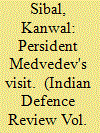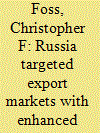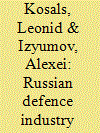| Srl | Item |
| 1 |
ID:
162238


|
|
|
|
|
| Summary/Abstract |
The article examines the organisational transformation of the Russian defence industry during the period of privatisation and radical market reforms. The study is based on the results of an original large-scale longitudinal survey of the directors (CEOs) of the industry. We find that over a decade of transition, 1996–2006, Russian defence industry managers were able largely to preserve the production potential of their enterprises and make them capable of operating under market conditions. Coupled with the restoration of government orders and the 2020 rearmament programme, these newly acquired market skills have contributed to the impressive revival of the Russian defence industry in the Putin era.
|
|
|
|
|
|
|
|
|
|
|
|
|
|
|
|
| 2 |
ID:
102313


|
|
|
| 3 |
ID:
125882


|
|
|
|
|
| Publication |
2012.
|
| Summary/Abstract |
Russia's Ural VagonZavod has developed an evolved version o fits latest standard T-90S main battle tank (MBT), which it is now aiming at the export market.
|
|
|
|
|
|
|
|
|
|
|
|
|
|
|
|
| 4 |
ID:
106218


|
|
|
|
|
| Publication |
2011.
|
| Summary/Abstract |
Since the start of market reforms, enterprises of the Russian military-industrial complex have lived through a massive crisis and a spectacular revival. Using original data from a longitudinal survey covering the period of 1995-2006, this article analyses the impact of transformation in the defence industry on labour and labour-management relations. We find that by the mid-2000s defence enterprises were largely able to stop job losses, eliminate wage arrears and restore wages to the level prevailing in the civilian economy. The study confirms that compared to other sectors of the Russian economy, defence enterprises continue to carry a strong legacy of the Soviet system. The dominant role of state ownership and government orders, along with the relative geographical isolation of defence enterprises and obvious factors of secrecy and security, made labour at these enterprises less willing to challenge management or owners by strikes and open protests. On the other hand, workers of defence enterprises can count on a more paternalistic attitude from managers and relatively more generous welfare benefits.
|
|
|
|
|
|
|
|
|
|
|
|
|
|
|
|